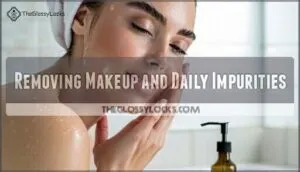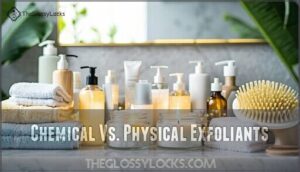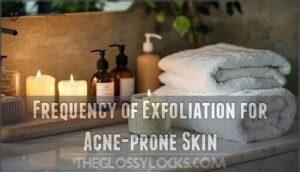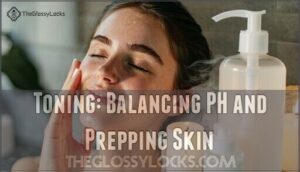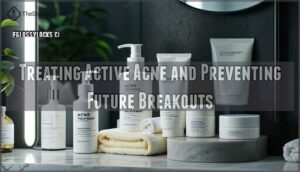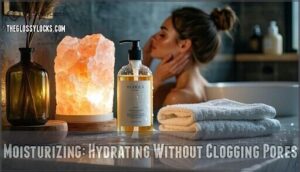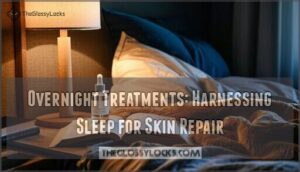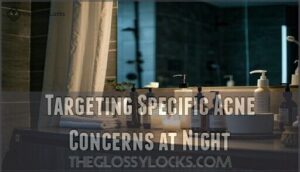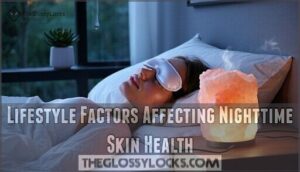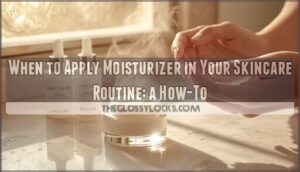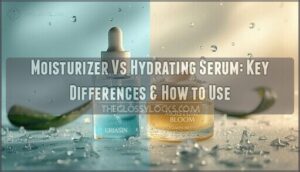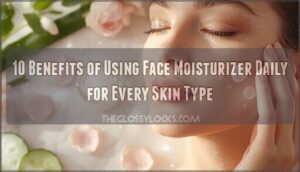This site is supported by our readers. We may earn a commission, at no cost to you, if you purchase through links.
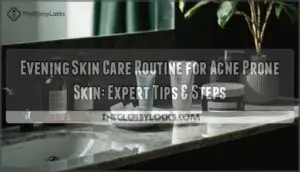
Follow with a gentle chemical exfoliant containing salicylic acid to unclog pores without irritation. Apply a targeted acne treatment with benzoyl peroxide or retinoids to active breakouts.
Don’t skip moisturizer—choose a lightweight, non-comedogenic formula to maintain your skin’s barrier without triggering more breakouts. Finish with spot treatments on stubborn blemishes.
The key is consistency and patience, as your skin needs time to adjust to new products. Understanding which ingredients work best for your specific acne type makes all the difference.
Table Of Contents
- Key Takeaways
- Evening Skincare Essentials for Acne-Prone Skin
- Cleansing: First Step to Clear Skin
- Exfoliation: Unclogging Pores and Preventing Breakouts
- Toning: Balancing PH and Prepping Skin
- Treating Active Acne and Preventing Future Breakouts
- Moisturizing: Hydrating Without Clogging Pores
- Overnight Treatments: Harnessing Sleep for Skin Repair
- 8 Best Evening Skincare Products for Acne
- 1. Naturium Niacinamide Cleansing Gel
- 2. CeraVe Acne Treatment Face Wash
- 3. Hero Cosmetics Blackhead Clearing Toner
- 4. Paula’s Choice Acne Treatment Benzoyl Peroxide
- 5. REN T Zone Balancing Gel Cream
- 6. Peach Slices Acne Moisturizer
- 7. Neutrogena Hydro Boost Facial Cleanser
- 8. EltaMD UV Daily SPF 40 Sunscreen
- Targeting Specific Acne Concerns at Night
- Lifestyle Factors Affecting Nighttime Skin Health
- Frequently Asked Questions (FAQs)
- What should my night skincare routine be for acne?
- What to do before bed to get rid of acne?
- What is the skincare routine for acne-prone people?
- What should your evening skincare routine be?
- Can I use the same products for morning and night?
- How often should I change my pillowcase to prevent acne?
- Will using a humidifier in my bedroom affect my skin?
- Can I still wear makeup if I have acne-prone skin?
- Does the temperature of my shower water affect my acne?
- Can I use retinol with other acne treatments?
- Conclusion
Key Takeaways
- Double cleanse every night – You’ll need an oil-based cleanser followed by a water-based one to remove makeup, sunscreen, and daily buildup that can clog pores and trigger breakouts.
- Use chemical exfoliants over physical scrubs – You should choose salicylic acid or glycolic acid 1-3 times weekly instead of harsh scrubs that can irritate active breakouts and worsen inflammation.
- Don’t skip moisturizer despite having oily skin – You need lightweight, non-comedogenic formulas because skipping hydration causes your skin to overproduce oil, creating more breakouts.
- Consistency beats perfection in your routine – You’ll see better results sticking with gentle products for 6-8 weeks rather than constantly switching, since your skin needs time to adjust to new treatments.
Evening Skincare Essentials for Acne-Prone Skin
Your nighttime skincare routine becomes your most powerful weapon against acne when you understand how to work with your skin’s natural repair cycle.
An effective evening routine removes daily buildup, treats active breakouts, and prevents future blemishes while maintaining your skin’s essential moisture barrier.
Importance of Consistent Nighttime Routine
Your evening skincare routine acts as a nightly reset button for acne-prone skin.
Consistency matters because your skin repairs itself during sleep, making nightly rituals essential for acne prevention.
A consistent skincare routine helps regulate oil production and prevents breakouts from forming overnight.
Sleep quality improves when you establish regular habits, creating the perfect environment for skin renewal and healing.
Establishing a gentle nighttime skin care routine is essential for maintaining healthy skin.
Addressing Specific Acne Concerns
Throughout your evening skincare routine, targeting specific concerns like acne scars, skin inflammation, and stubborn breakouts becomes essential.
Your nighttime regimen should focus on oil regulation and pore minimization while promoting breakout prevention.
Acne prone skin requires customized acne treatment approaches that address individual triggers.
Whether you’re dealing with hormonal fluctuations or cystic formations, strategic acne fighting products help restore balance and clarity overnight.
Balancing Skin Hydration and Oil Control
Your skin’s oil balance and hydration tips work together like a well-tuned orchestra.
Acne prone skin needs moisture retention without excess sebum production. Your nighttime skincare routine should focus on skin pH restoration and pore minimization through strategic product layering.
- Choose water-based, moisturizer for acne with niacinamide for oil control
- Apply hydrating serums on damp skin for better absorption
- Use lightweight gel formulas that won’t clog pores overnight
- Layer products from thinnest to thickest consistency for ideal skin hydration
Cleansing: First Step to Clear Skin
Your evening cleansing routine starts with removing the day’s buildup of makeup, sunscreen, and environmental pollutants that can clog pores and trigger breakouts.
Proper cleansing creates a clean foundation for acne treatments to work effectively while preventing bacteria from settling into your skin overnight, which is crucial for maintaining healthy skin.
Removing Makeup and Daily Impurities
Think of makeup removal as clearing a canvas – you can’t paint a masterpiece on a dirty surface.
Start your daily cleansing ritual by dissolving stubborn makeup with an oil-based cleanser or micellar water. This essential impurity control step prevents pore-clogging residue from sabotaging your skin overnight.
Follow with double cleansing using a gentle water-based cleanser for complete grime removal and ideal skin purification. Your oil management success starts here.
For effective results, consider using dermatologist approved techniques to achieve a deeper clean.
Choosing The Right Cleanser for Acne
Three cleanser types work best for acne-prone skin: foaming cleansers for oily skin, gel-based for combination skin, and cream cleansers for dry, sensitive acne skin care.
Your facial cleanser should maintain skin pH balance around 5.5 while providing gentle cleansing and oil control.
Choose acne treatment skincare products with salicylic acid or benzoyl peroxide for your evening skincare routine.
When selecting a cleanser, consider using a product with ingredients found in an acne face wash to help control acne.
Double Cleansing Method for Thorough Cleaning
Beyond surface-level cleansing, double cleansing guarantees complete oil removal and pore unclogging for acne prone skin.
This evening skincare routine essential involves:
- Apply cleansing oil to dissolve makeup and sebum
- Massage gently for skin purification
- Rinse with lukewarm water
- Follow with noncomedogenic water-based cleanser
Proper cleanser selection targets acne-causing bacteria while maintaining your skin’s protective barrier.
Exfoliation: Unclogging Pores and Preventing Breakouts
Exfoliation removes dead skin cells and excess oil that clog pores, making it essential for preventing breakouts in your evening routine.
You’ll need to choose between chemical exfoliants like salicylic acid or physical scrubs, with chemical options being gentler and more effective for acne-prone skin.
Chemical Vs. Physical Exfoliants
Now that your skin is properly cleansed, you’ll need to choose between chemical and physical exfoliants for your acne-prone skin exfoliation routine.
Chemical exfoliants use acids like salicylic or glycolic to dissolve dead skin cells, while physical exfoliants manually remove them through scrubbing action.
- Chemical exfoliants penetrate deeper into pores, making them ideal for acne-prone skin
- Physical exfoliants work only on the surface and can irritate active breakouts
- Acid peels and enzyme exfoliants offer gentler alternatives to harsh gentle scrubs
Chemical exfoliants prove superior for managing skin texture issues without causing micro-tears that worsen acne.
For effective skin care, understanding exfoliation methods is essential for achieving desirable results.
Frequency of Exfoliation for Acne-prone Skin
Finding the right exfoliation frequency prevents irritation while maximizing pore unclogging benefits.
Your evening skincare routine should include gentle peeling based on your skin’s tolerance.
Most acne prone skin benefits from 1-3 weekly sessions, but overdoing it triggers inflammation and worsens breakouts.
| Skin Type | Weekly Frequency |
|---|---|
| Oily | 2-3 times |
| Dry/Sensitive | 1-2 times |
| Combination | 2 times |
| Reactive | 1 time |
Start slowly with your exfoliating routine and adjust based on how your skin responds to acne treatment protocols.
Gentle Exfoliation Techniques
Several chemical exfoliants work wonders for your evening skincare routine without harsh scrubbing.
Salicylic acid penetrates deep for effective pore cleansing, while glycolic acid promotes skin renewal.
Chemical peels offer controlled exfoliation for acne-prone skin exfoliation.
Try enzyme treatments or silicone brushes with your gentle cleanser for physical options.
Facial massage during your exfoliating routine enhances circulation and product absorption.
Toning: Balancing PH and Prepping Skin
After cleansing and exfoliation, toning becomes your skin’s reset button, restoring ideal pH levels while removing any lingering impurities that could clog pores.
You’ll want to choose alcohol-free formulas that prep your skin for treatment products without causing irritation or triggering excess oil production.
Benefits of Toning for Acne-prone Skin
Once you’ve finished exfoliating, toner benefits become your skin’s best friend for acne prevention and oil regulation.
This step restores your skin’s natural pH balance after cleansing, creating the perfect environment for healing.
Toner minimizes pores, controls excess sebum production, and preps your skin to absorb treatments more effectively.
Alcoholfree toners work particularly well for acneprone skin care, reducing inflammation while maintaining hydration.
Think of toning as fine-tuning your skin’s foundation.
Alcohol-free Toner Options
For acne-prone skin, alcohol-free toners offer gentle pH balance without irritation.
These formulas restore skin’s natural barrier while prepping for treatments.
Top alcohol-free toner options include:
- Niacinamide-based toners – reduce inflammation and control oil production
- Salicylic acid toners – gently exfoliate and unclog pores
- Witch hazel formulas – provide natural astringent benefits without drying
- Rose water toners – soothe irritated skin with anti-inflammatory properties
- Green tea-infused options – deliver antioxidants for acne treatment support
These gentle toners maintain ideal pH levels while supporting your evening skin care routine’s effectiveness.
Application Techniques for Maximum Effectiveness
Now that you’ve chosen your alcohol-free toner, proper application techniques maximize its effectiveness in your evening skin care routine.
Here’s how to apply toner for acne-prone skin:
- Gentle Strokes with Cotton Pad – Saturate a cotton pad and sweep across your face using light, upward motions following facial mapping principles
- Skin Temperature Consideration – Allow toner to reach room temperature before application for better absorption and comfort
- Product Layering Strategy – Wait 30 seconds between toner and next skincare step, enabling proper penetration before double cleansing or exfoliation treatments
Treating Active Acne and Preventing Future Breakouts
When you’re dealing with active breakouts, targeted treatments become your skin’s best friend at night.
This is when you’ll apply spot treatments to existing blemishes and use all-over treatments to prevent future acne from forming across your entire face, which can be considered preventive measures.
Spot Treatments for Existing Blemishes
Now you’re ready to target those stubborn blemishes with precision spot treatments. These concentrated formulas deliver acne fighting ingredients directly to problem areas without overwhelming your entire face.
Look for benzoyl peroxide or salicylic acid for effective pimple reduction. Apply spot therapy only to active breakouts, not surrounding skin.
Blemish control works best when you resist picking—let these treatments handle the blemish healing process overnight.
Understanding the importance of a daily skincare routine is vital for maintaining clear skin and preventing future breakouts.
All-over Treatments for Acne-prone Areas
While spot treatments target individual blemishes, all-over treatments provide thorough acne prevention and skin renewal across your entire face.
These evening skin care routine staples contain acne fighting ingredients like salicylic acid or retinoids that promote oil control and pore minimization.
Apply these treatments to clean skin before moisturizer for maximum breakout reduction.
Overnight acne treatments work while you sleep, making them perfect for your acne prone skin routine.
Ingredients to Look for in Acne Treatments
Finding the right acne treatment ingredients can transform your skincare routine from frustrating to effective.
Look for these powerhouse components that target different aspects of acne formation:
- Salicylic Acid – This beta-hydroxy acid penetrates deep into pores, dissolving oil and dead skin cells that cause blackheads and whiteheads
- Benzoyl Peroxide – Your antibacterial ally that kills acne-causing bacteria while helping remove excess oil from clogged pores
- Retinoids like Adapalene – These regulate cell turnover and reduce inflammation, making them gold-standard acne treatments
Niacinamide also deserves attention for controlling oil production without irritation.
Using a salicylic acid product can be particularly beneficial in treating acne.
Moisturizing: Hydrating Without Clogging Pores
You might think moisturizing will make your acne worse, but skipping this step actually triggers your skin to produce more oil.
The key is choosing lightweight, non-comedogenic formulas that hydrate without clogging pores.
Importance of Moisturizing Acne-prone Skin
Acne-prone skin desperately needs hydration, despite common myths suggesting otherwise.
When you skip moisturizer, your skin overproduces oil to compensate for dryness. This creates a vicious cycle where oil control becomes impossible.
Skin hydration strengthens your skin barrier, reducing inflammation and preventing future breakouts.
Moisturising acne prone skin properly supports acne prevention by maintaining balanced moisture levels and protecting against irritants.
Lightweight, Non-comedogenic Moisturizer Options
Successfully selecting the right moisturizer prevents your acne-prone skin from overproducing oil while maintaining essential skin hydration.
These dermatologist-recommended, lightweight options deliver gentle formulas without clogging pores:
- Vanicream Daily Facial Moisturizer – ceramides and hyaluronic acid for sensitive skin
- CeraVe Ultra-Light Moisturizing Lotion – oil-free with ceramides for daily use
- La Roche-Posay Toleriane Double Repair – 48-hour hydration with niacinamide
- Neutrogena Hydro Boost Water Gel – fast-absorbing hyaluronic acid formula
These noncomedogenic moisturizers absorb quickly, supporting your nighttime skincare routine without triggering breakouts or leaving residue.
Using the right acne moisturizer products is essential for effective acne management and skin health.
Balancing Oil Production With Hydration
Your skin’s oil control and hydration work like a thermostat.
When you skip moisturizer, your skin panics and produces more oil.
Noncomedogenic moisturizers help maintain moisture balance without triggering breakouts.
Look for lightweight formulas with niacinamide or hyaluronic acid that support pore minimization and acne prevention.
Your nighttime skincare routine should hydrate acne prone skin while controlling excess sebum production effectively.
Overnight Treatments: Harnessing Sleep for Skin Repair
Your skin’s natural repair processes kick into high gear while you sleep, making overnight treatments your secret weapon against stubborn acne.
These concentrated formulas work for hours to penetrate deep into pores, target breakouts, and accelerate healing without the interference of makeup or environmental stressors.
Benefits of Overnight Acne Treatments
Transform your evening routine with overnight acne treatments that work while you sleep.
These targeted formulations deliver sustained acne reduction through extended contact time, allowing active ingredients to penetrate deeper into pores.
Overnight skincare maximizes skin repair by leveraging your body’s natural healing cycle, when cell turnover peaks.
Sleep therapy for your complexion reduces inflammation and prevents future breakouts more effectively than daytime treatments.
Types of Overnight Masks and Serums
Everyone deserves effective overnight treatments that work while you sleep.
Choose from these proven options for clearer skin:
- Hydrating Masks – gel-based formulas with hyaluronic acid deliver deep moisture without clogging pores
- Exfoliating Gels – chemical exfoliants containing salicylic acid gently unclog pores overnight
- Acne Serums – targeted treatments with niacinamide reduce inflammation and control oil production
- Overnight Peels – gentle acids like glycolic promote cell turnover for smoother texture
These overnight skincare essentials transform your acne treatment routine into a powerful skin repair system.
Frequency of Use for Optimal Results
Finding the right application frequency for overnight treatments requires careful skin cycling and product rotation.
Start with once weekly for potent acne treatment products, then gradually increase based on your skin’s response. Most evening routine products work best every 2-3 nights, allowing proper treatment duration between applications.
Your acne prone skin needs time to adapt, so establish consistent dosing intervals. Monitor for irritation or dryness – these signal you’re overdoing it.
Remember, your skin care routine should enhance, not overwhelm. Patience pays off when building tolerance to active ingredients in your nighttime regimen.
To avoid dryness, consider using dry skin relief methods to keep your skin hydrated and healthy.
8 Best Evening Skincare Products for Acne
Finding the right evening skincare products can transform your acne-prone skin while you sleep. These eight dermatologist-recommended products target breakouts, unclog pores, and support overnight skin repair without causing irritation.
1. Naturium Niacinamide Cleansing Gel
Consider the Naturium Niacinamide Cleansing Gel your evening skin care routine’s secret weapon. This gel cleanser contains 3% niacinamide, delivering impressive niacinamide benefits including oil control and skin barrier strengthening.
The formula effectively removes makeup, excess sebum, and daily impurities without stripping your skin—a vital factor for acne prone skin. Niacinamide works overtime in this acne treatment, reducing inflammation while regulating sebum production.
The gentle gel texture makes it suitable for various skin types, from oily to sensitive. You’ll find it particularly effective for acne prevention when used consistently in your nighttime routine.
A small amount creates adequate cleansing power, making this product economical. However, some users may experience dryness, so patch test first. Use it as your second cleanser in a double-cleansing routine for ideal results.
Best For: Those with oily, combination, or blemish-prone skin seeking gentle yet effective cleansing.
2. CeraVe Acne Treatment Face Wash
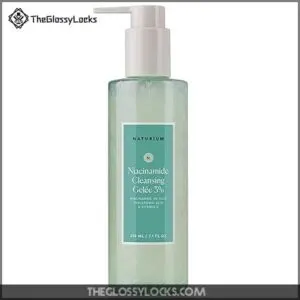
You’ll find CeraVe Acne Treatment Face Wash packed with 2% salicylic acid and purifying clay – two powerhouse ingredients that tackle acne at its source.
This facial cleanser transforms from gel to foam, making it perfect for your evening routine when you need thorough skin cleansing after a long day.
The CeraVe Benefits shine through its gentle exfoliation approach.
Unlike harsh scrubs that can irritate acne prone skin, this face wash uses chemical exfoliation to dissolve dead skin cells and unclog pores.
The salicylic acid penetrates deep into your pores, while the clay absorbs excess oil without stripping your skin’s natural barrier.
What sets this acne treatment apart is its daily-use formula.
You can incorporate it into your skincare routine without worrying about over-drying or irritation.
The gentle foam rinses clean, leaving your skin prepped for the next steps in your evening regimen.
Best For: Oily, acne-prone skin types seeking effective pore-clearing without harsh side effects.
3. Hero Cosmetics Blackhead Clearing Toner
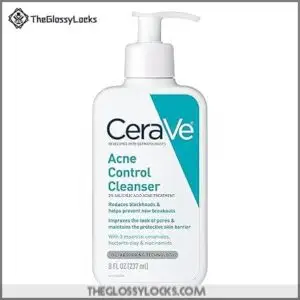
After cleansing with CeraVe’s gentle formula, Hero Cosmetics Blackhead Clearing Toner steps up your evening skin care routine with targeted blackhead removal power.
This skin purifying toner combines BHA, PHA, and AHA acids for thorough acne prevention without harsh irritation.
The toner benefits include deep pore minimizing action that tackles stubborn blackheads while maintaining your skin’s moisture balance.
Aloe and lotus water provide soothing relief, making this blackhead clearing formula perfect for acne prone skin that needs gentle yet effective treatment.
Apply this acne treatment to problem areas or use it 2-3 times weekly across your entire face.
The multi-acid blend works overnight, dissolving pore-clogging debris while you sleep.
Start slowly to assess your skin’s tolerance, then build up frequency as needed.
Best For: Those with oily or combination skin seeking targeted blackhead reduction and visible pore refinement.
4. Paula’s Choice Acne Treatment Benzoyl Peroxide
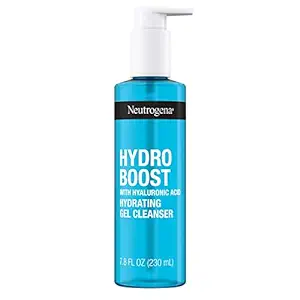
Within your evening skincare routine, Paula’s Choice Acne Treatment delivers therapeutic benzoyl peroxide that penetrates deep into pores to eliminate acne-causing bacteria.
This FDA-approved acne treatment transforms your skin purification process through targeted oil control mechanisms.
Here’s how this powerhouse product works for acne prone skin:
- Kills bacteria instantly – Benzoyl peroxide creates an oxygen-rich environment that destroys P. acnes bacteria on contact
- Reduces inflammation – Active ingredients calm existing breakouts while preventing new ones from forming
- Controls excess oil – Helps regulate sebum production without over-drying your complexion
- Prevents future breakouts – Continuous use maintains clear pores and balanced skin
This skincare routine for acne requires patience – expect visible improvements within 30-90 days of consistent evening application.
The formula suits all skin types, including those battling stubborn cystic acne.
Best For: Those struggling with persistent acne, especially oily skin prone to cystic breakouts.
5. REN T Zone Balancing Gel Cream
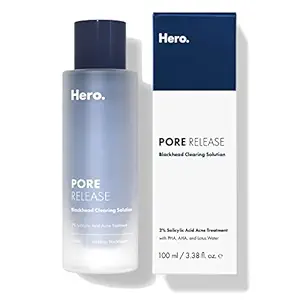
Moving from spot treatments to thorough moisturizing, REN T-Zone Balancing Gel Cream targets your oily T-zone without overloading your skin.
This gel-cream hybrid delivers superior oil control while maintaining essential hydration for acne prone skin.
The lightweight formula absorbs quickly, providing gel cream benefits that mattify shine without triggering breakouts.
Perfect for your evening skin care routine, this moisturizer excels at skin balancing and t zone care.
It won’t clog pores or leave residue that could worsen acne prevention efforts.
The non-comedogenic formula helps regulate sebum production overnight, supporting your skin care routine for acne.
Best For: Oily, combination, or acne-prone skin types seeking targeted acne skin tips for balanced hydration.
6. Peach Slices Acne Moisturizer
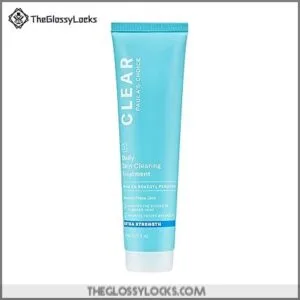
Peach Slices Acne Moisturizer delivers targeted skin hydration while maintaining oil control through its 0.5% salicylic acid formula.
This lightweight moisturizer fits perfectly into your evening skin care routine, providing dual-action benefits for acne prone skin.
The hyaluronic acid component helps to provide deep moisture without clogging pores, while salicylic acid gently exfoliates to prevent future breakouts.
Gentle formulas like this one work overnight to:
- Calm inflamed skin while you sleep
- Reduce morning redness and irritation
- Restore your skin’s natural moisture barrier
The oil-free formula absorbs quickly, making it ideal for nighttime application.
Users appreciate how this acne moisturizer balances hydration needs without triggering new blemishes, though some may find it slightly tacky initially.
Best For: Acne-prone skin requiring balanced hydration and blemish prevention.
7. Neutrogena Hydro Boost Facial Cleanser
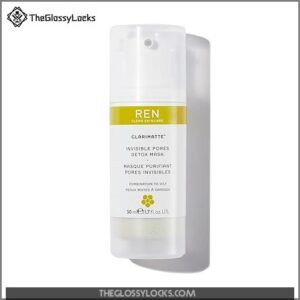
Since you’re dealing with acne-prone skin, Neutrogena Hydro Boost Facial Cleanser offers the perfect balance of gentle cleansing and deep hydration.
This gel-based facial cleanser features hyaluronic acid that locks in moisture while effectively removing makeup, oil, and acne-causing bacteria without stripping your skin’s natural barrier.
| Feature | Benefit |
|---|---|
| Hydration Benefits | Hyaluronic acid maintains skin moisture levels |
| Ingredient Analysis | Non-comedogenic formula won’t clog pores |
| Skin Compatibility | Suitable for sensitive, acne-prone skin types |
User reviews consistently praise this skincare for acne solution as part of their acne care routine, noting how it doesn’t leave skin feeling tight or dry.
For your skincare routine acne management, this cleanser alternatives traditional harsh formulas that can trigger breakouts.
The acneprone skin cleansing process becomes gentler yet effective.
8. EltaMD UV Daily SPF 40 Sunscreen
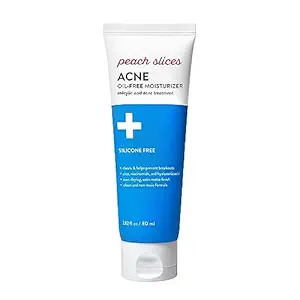
Although evening routines typically focus on cleansing and treatment, sunscreen remains vital for acne prone skin protection.
EltaMD UV Daily SPF 40 delivers broad-spectrum protection through its zinc oxide benefits, creating a barrier against UV damage that can worsen acne scarring. This lightweight formula absorbs quickly without leaving residue, making it ideal for sensitive skin types.
The non-comedogenic formulation won’t clog pores or trigger breakouts, while hyaluronic acid provides hydration. Perfect for daily use, this sunscreen integrates seamlessly into any skin care routine.
Though pricier than drugstore options, it’s worth the investment for reliable skin protection. The fragrance-free, paraben-free formula guarantees compatibility with other skin care products in your regimen.
Best For: People with acne-prone skin seeking lightweight, non-greasy sun protection that won’t clog pores.
Targeting Specific Acne Concerns at Night
Different types of acne require targeted nighttime approaches for effective treatment and prevention.
Your evening routine can be customized to address specific concerns like hormonal fluctuations, deep cystic breakouts, or combination skin patterns that affect different areas of your face, which may involve a nighttime approach.
Addressing Hormonal Acne
Hormonal acne often strikes during menstrual cycles, pregnancy, or menopause due to androgen fluctuations.
You’ll need targeted hormone regulation through birth control or spironolactone efficacy under dermatologist guidance.
Adult female acne responds well to retinol in your skin care routine, which helps regulate cell turnover and reduces breakouts on acne-prone skin effectively.
Treating Cystic Acne
Cystic acne represents the most severe form of acne breakouts, causing deep, painful nodules beneath your skin’s surface.
These stubborn bumps resist typical over-the-counter treatments, often requiring specialized severe acne treatments and dermatologist intervention for effective management.
Key strategies for cystic acne treatment include:
- Professional acne medications like prescription retinoids or antibiotics
- Inflammation reduction through corticosteroid injections for active cysts
- Scarring prevention with early, aggressive treatment protocols
- Consistent acneprone skin treatment combining gentle cleansing with targeted therapies
Understanding cystic acne causes helps you recognize when home remedies won’t cut it – genetics, hormonal fluctuations, and deep bacterial infections require medical-grade intervention for ideal results.
Managing Combination Skin With Acne
Managing combination skin with acne requires a balancing act between hydration and oil control.
Your evening routine should address both oily and dry zones without causing acne breakouts.
Here’s your targeted approach:
- Zone-specific cleansing: Use gentle, non-comedogenic cleansers that won’t strip your skin’s natural barrier while removing excess oil from your T-zone.
- Strategic layering products: Apply lightweight, oil-free moisturizers to dry areas while using targeted treatments containing salicylic acid on acne-prone zones.
- Seasonal adjustments: Modify your skin care routine based on weather changes, increasing hydration during winter and implementing stronger preventative measures during humid months when breakouts typically worsen.
To manage this, consider how hormonal shifts affect acne.
Lifestyle Factors Affecting Nighttime Skin Health
Your nighttime skin health extends beyond skincare products to include lifestyle choices that can make or break your acne management efforts.
Simple changes like using clean pillowcases, maintaining proper hydration, and managing stress can substantially impact your skin’s ability to heal and prevent new breakouts while you sleep, which is crucial for acne management efforts.
Importance of Clean Pillowcases
Your pillowcase collects oils, bacteria, and dead skin cells nightly. This buildup creates the perfect breeding ground for acne-causing bacteria that transfer back to your acne prone skin.
Replace pillowcases twice weekly and wash in hot water to eliminate bacteria prevention concerns.
| Pillowcase Materials | Acne Impact |
|---|---|
| Cotton | Absorbs oils, moderate bacteria buildup |
| Silk | Reduces friction, less skin sensitivity |
| Bamboo | Naturally antimicrobial, breathable |
| Microfiber | Traps bacteria, increases acne triggers |
| Linen | Good airflow, prevents moisture retention |
Clean pillowcases support your evening routine by preventing breakout prevention setbacks. Washing frequency matters more than material choice for maintaining healthy acne prone skin.
Diet and Hydration for Clear Skin
Your skin reflects what you consume, making diet and hydration essential for acne-prone skin health.
Proper hydration benefits include flushing toxins while supporting your skin’s natural barrier function.
Consider these evidence-based dietary strategies:
- Limit sugar impact – High-glycemic foods increase sebum production and inflammation
- Navigate the dairy debate – Milk proteins may trigger hormonal acne flare-ups
- Support gut health – Probiotics and fiber reduce inflammatory foods’ effects on skin
Stress Management Techniques for Acne Reduction
While proper nutrition supports healthy skin, stress management plays an equally important role in your acne journey.
Chronic stress triggers cortisol production, which stimulates oil glands and worsens breakouts.
Mindfulness practices like meditation help calm your nervous system, while deep breathing exercises provide immediate relief during stressful moments.
Regular exercise benefits include improved circulation and sleep quality, both essential for skin barrier repair.
Don’t underestimate support systems – talking through problems reduces stress hormones that fuel inflammation.
These techniques work together to improve acne-prone skin health naturally.
Frequently Asked Questions (FAQs)
What should my night skincare routine be for acne?
Start with double cleansing using oil-based then water-based cleanser. Apply salicylic acid or adapalene treatment. Follow with lightweight, non-comedogenic moisturizer. Use retinoids 2-3 times weekly for cell turnover.
What to do before bed to get rid of acne?
Breaking news: your pillowcase isn’t plotting against you, but it might be harboring acne-causing bacteria.
Double-cleanse with oil-based then water-based cleansers, apply targeted treatments like salicylic acid or adapalene, and moisturize with lightweight, non-comedogenic formulas to prevent overnight breakouts, using methods like double-cleanse.
What is the skincare routine for acne-prone people?
You’ll need double cleansing, salicylic acid treatment, adapalene retinoid, and lightweight moisturizer nightly. Consistency beats perfection – stick with gentle products that won’t strip your skin’s natural barrier.
What should your evening skincare routine be?
Evening routines should focus on deep cleansing to remove makeup and daily grime, followed by targeted treatments.
Double cleanse first, then apply serums with salicylic acid or retinoids, and finish with lightweight moisturizer.
Can I use the same products for morning and night?
Smart skincare switching saves time while maximizing results. You’ll need different products for morning and evening routines since daytime requires sun protection while nighttime focuses on repair and treatment actives.
How often should I change my pillowcase to prevent acne?
Change your pillowcase every 2-3 days to prevent bacteria and oil buildup that can trigger breakouts.
Clean fabric creates a fresh surface that won’t transfer pore-clogging debris back to your skin.
Will using a humidifier in my bedroom affect my skin?
A bedroom humidifier can improve acne-prone skin by maintaining ideal moisture levels, preventing your skin from overproducing oil to compensate for dryness and environmental irritation.
Can I still wear makeup if I have acne-prone skin?
You can absolutely wear makeup with acne-prone skin! Choose non-comedogenic, oil-free products and always remove makeup thoroughly with double cleansing to prevent clogged pores and breakouts.
Does the temperature of my shower water affect my acne?
Hot shower water strips your skin’s natural oils, triggering overproduction of sebum that clogs pores and worsens acne.
You’ll see better results using lukewarm water to maintain your skin’s protective barrier.
Can I use retinol with other acne treatments?
Yes, you can safely combine retinol with other acne treatments.
Adapalene pairs well with salicylic acid in 24-hour routines.
Start slowly, use retinol at night, and avoid mixing with benzoyl peroxide simultaneously to prevent irritation.
Conclusion
Rome wasn’t built in a day, and neither is clear skin. Your evening skin care routine for acne prone skin requires patience and consistency to deliver results.
Start with double cleansing, follow with gentle chemical exfoliation, and apply targeted treatments containing benzoyl peroxide or retinoids.
Don’t skip moisturizer—choose lightweight, non-comedogenic formulas that hydrate without clogging pores. Remember, your skin needs time to adjust to new products, so stick with your routine for at least 6-8 weeks before making changes.
- https://www.beautybay.com/edited/evening-skincare-routine-acne-prone-skin/
- https://www.theskininstitute.org/skincare-mistakes-can-worsen-acne/
- https://www.ncbi.nlm.nih.gov/books/NBK279208/
- https://www.schweigerderm.com/skin-care-articles/acne/dermatologist-recommended-skin-care-routine-for-hormonal-acne/
- https://www.webmd.com/skin-problems-and-treatments/acne/features/best-ingredients-for-acne-prone-skin

